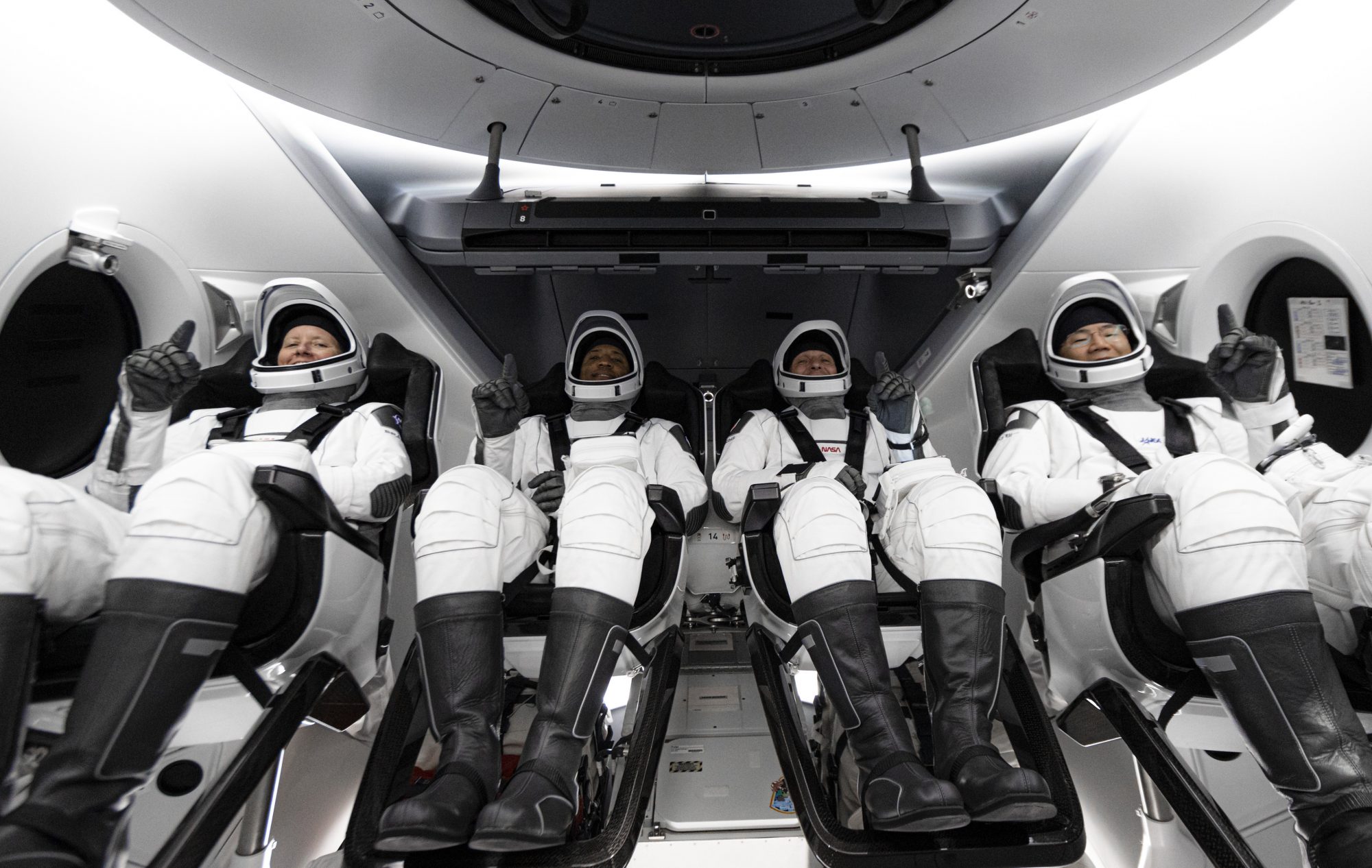Crew-1 Mission. Credits: SpaceX / Flickr
His beady, red eyes filled with tears and his bottom lip trembled. It was the year 2012, and Elon Musk had just been told by Scott Pelley in an interview that his personal heroes disagreed with his ambitions for commercialised space flight. “You know, there are American heroes who don’t like this idea. Neil Armstrong, Gene Cernan…both have testified against commercial space flight in the way you’re developing it. I wonder what you think of that?” Musk paused to recollect his thoughts. Swallowing the lump in his throat, the billionaire replied, “Those guys are heroes of mine, so it’s really tough…I’m trying to make a difference in spaceflight and make it accessible to almost anyone.”
Eight years later, the Crew Dragon Spacecraft — a vessel built and operated entirely by SpaceX — successfully docked at the International Space Station. Carrying four astronauts, the launch represented the private sector’s commercial capability in safely and reliably transporting individuals into outer space. Kathy Lueders, NASA’s human spaceflight chief, neatly summarised the importance of the flight: “It was a dream of us to be able to one day…have crew and transportation services to the International Space Station…and today that dream became reality. It’s the start of a new era.”
The start of a new era, indeed. But SpaceX’s launch does not only herald a new era of space travel. It marks the beginning of a new era of capitalism, one led by Silicon Valley entrepreneurs seeking to inject their wealth deep into the cosmos.
Neil Armstrong once described his visit to the moon as a small step for man, but a giant leap for mankind. But his statement will now have to be reformulated. Commercialised space travel does not represent a giant leap for mankind, but rather a giant leap for the capitalistkind — the earthly, billionaire social class seeking to lead humanity to another corporality.
It was in 1913 when Rosa Luxemburg identified a defining feature of capitalism. Capitalism, she wrote in The Accumulation of Capital, always required a non-capitalist entity, one that existed outside of itself that it could always appropriate. Whether this took the form of imperialism or the privatisation of public goods, Luxemburg maintained that capitalism had a desire for accumulation beyond its existing realm.
Luxemburg’s view, however, was criticised by many on the left and right. The central criticism had been this: Luxemburg’s argument no longer held when faced with the economic reality of the 21st century. For Hardt especially, the global market is such that the distinction between a capitalist inside and a non-capitalist outside has largely been rendered moot. Pointing out that capitalism is now the dominant economic system of most countries, Hardt maintains that the dichotomy that once characterised an early 20th century viewpoint of the world is no longer fit for purpose.
The reality is that both ideas contain elemental truths. Capitalism does require non-capitalist entities to appropriate, and earthly capitalism is facing a crisis. As the ability of capitalism to spread, annex and accumulate becomes limited by the planet’s finite geography, capitalists look in despair. But all is not lost. Capitalism now has the cosmos in its sights. Neither privately nor publicly owned, outer space is a geography that is terra nullius — nobody’s land. An entity that can be exploited and commoditised, the galaxies represent an infinite access to an array of different resources.

Credits: SpaceX
The late Marxist geographer, Neil Smith, adequately summarised capitalism’s relationship with celestial bodies: “No part of the Earth’s Surface, the atmosphere, the oceans, the geological substratum or the biological superstratum, are immune from transformation.” With 21st century space travel, the galaxy can now be added to the list of resources being stalked by capital.
When Alan Shepard launched into suborbital flight on May 5 1961, the United States found itself in an all-out rivalry against the Soviet Union. Since the 1950s, both superpowers had competed religiously to outdo the other in human spaceflight, each seeking to demonstrate to the other that it had the superior technological know-how to lead humanity into new frontiers.
Shepard had been picked as one of the Mercury Seven, a group of elite astronauts selected under Project Mercury, the United States’ first human spaceflight program. In the end, Shepard achieved the goal of becoming the first American to enter space. Rather than feeling accomplished, however, Shepard remained furious. Only twenty-three days earlier had Yuri Gagarin, a Soviet cosmonaut, become the first ever human to journey into outer space.
“I think he was a little bit frustrated with NASA…for being a little bit overly cautious” said Neal Thompson, author of Light this Candle: The Life & Times of Alan Shephard. “He was a little bit pissed off that…the Russians were able to get there first. He felt like we had the capability to do it, but we nit-picked for too long and allowed ourselves to get beat.”
Shepard believed that, had it not been for the political and technical delays of Old Space — the name given by current industry insiders to the Cold War period of pace travel dominated by sluggish states — he would have become the first human to achieve Gagarin’s feat.
Shepard passed away in 1998, but this sentiment — that government involvement in the space industry is slow and technocratic — remains alive in the minds of NewSpace actors today. Now dominated by private enterprise like SpaceX and Blue Origin, NewSpace contends the space industry is better served by private enterprise. It insists on the leanness and competitiveness of the private sector, while denigrating the public sector as slow and wasteful.
NewSpace not only represents an industry, but also a worldview: one that at its core seeks to commercialise space to generate profit. Driven by the capitalistkind, NewSpace ultimately marks the arrival of private enterprise into space, and with it, capitalism into the cosmos.
But who are the capitalistkind? The capitalistkind can be described as a subset of billionaire entrepreneurs, the equity owners of international conglomerates and the frontrunners of global innovation. With close ties to California’s Silicon Valley, the capitalistkind make their fortune through the leverage of code, media and information technology — or a combination of all three. The capitalistkind are middle aged; young enough to appeal to youthful entrepreneurs looking to follow in their footsteps, yet old enough to command the respect expected as industry titans. What unites the capitalistkind is a commitment to three central ideals — capitalism, liberalism and laissez-faire economics — for it is under these three strands they have acquired their wealth.

Credits: SpaceX
The distinguishing feature of the capitalistkind, however, is their pre-occupation with space. Under capitalistkind logic, space is an arena to be democratised, moved away from the domain of government and placed under the purview of private enterprise. As Shammas notes, the capitalistkind propagate a post-statist narrative, one where corporations are the principal representatives of the everyman. In the age of the start-up, any humble citizen can become an agent of disruption, a force for change, an explorer of space and a potential member of the cadre of the capitalistkind. The goal for the capitalistkind is to rescue capitalism from its earthly limitations — and as capitalism evolves, ensure humanity evolves alongside it.
The capitalistkind ultimately represent a new, emerging class, one within the billionaire stratification itself. Arguably the elite billionaires and the most likely to become the next trillionaires, the capitalistkind demarcate “old-money” billionaires from the next generation of “new money” billionaires. Indeed, antiquated billionaires concern themselves with earthly matters. The capitalistkind concern themselves with extra-terrestrial ones instead.
During an interview with Business Insider, Jeff Bezos outlined his vision for a post-earthly existence. Bezos imagined a trillion humans living in outer space, with a thousand “Einsteins” and a “thousand Mozarts”, along with unlimited resources and solar power. The end result, for him, entailed a new intellectual and cultural renaissance, one that would spread across the solar system and truly emancipate humanity from its non-transcendental limitations.
At its core, Bezos pertained to a new human experience, and above all, a new human existence. And Bezos has not been alone. Barron Hilton, the former President of Hilton Hotels, long imagined more practical means of bringing humanity closer to an extra-terrestrial reality. Since the late 1960s, Hilton had envisaged “orbital hotels” — hotels in space — that could be used to meet the needs of consumers and tourists. The billionaire real estate magnate posited various designs, including large viewing windows and extended weightless stays, along with orbital pace stadiums and other space-fit entertainment venues. Design research, in fact, has long been underway. Bob Bigelow has already spent $500 million on orbital hotel design and construction, as well as scaled models and a cruise ship to transport tourists to the moon.
The capitalistkind therefore seek to bring in a new form of capitalism, one that shifts individual tastes away from the material consumption of goods and products, and towards the experiential. It is also one that involves a change of the human psyche, man’s relationship with his environment and what it means to be human. Indeed, successful colonisation and life in outer space would change humanity’s religion, philosophy, morality, history, art, literature, anthropology, psychology and biology – and along with it, the human condition.
For all the talk of human advancement, reality, however, would likely be more sombre. Barring space travel and colonisation of the cosmos for the many, extra-terrestrial activities would remain the domain of the rich for decades, if not centuries, to come. Axiom Space, an American company founded in 2016, attempted to recently sell tickets to board a SpaceX capsule for $55 million. For those with tens of millions to spare, the opportunity is a once in a lifetime. For the destitute, space travel represents yet another luxury for the elite, for those that no longer have to be concerned only with earthly matters.
An important goal for the capitalistkind is to lower the cost of space travel through competition. In the words of Don Thomas, the aspiration is to make prices “more in line with an exotic trip to Antarctica,” affordable to many if not all. But there would still be the issue of class and experience. Inequalities shape the human experience, and the humanisation of the universe would be no different. The wealthy, more eager, curious and confident in their abilities to dominate outerspace would flourish, with no reason to doubt otherwise, having conquered what it means to be successful on Planet Earth. For the more marginalised communities on Earth, the experience of space would be a mystifying and dominating one, increasing feelings of powerlessness. The underclass have yet to navigate the earthly world and human experience with “success” — never mind outer space.
For many on the left, the only choice would ultimately be the arena of exploitation for the underclass — Planet Earth or the solar system. As Pearson writes, “[Space capitalism] will look a lot like it does now…a life of work while wealth flows up to an interstellar elite…Trillions of humans; one thousand gray planets, one thousand petty plutocracies, and a universe of misery.”
At its most extreme, the universe would find itself grappling with a class divide. No longer would the class divide be restricted to Planet Earth, but to Planet Earth and outer space itself. With a planet facing the apocalypses of nuclear warfare, pandemics and climate change, what would remain to stop the elite from taking the journey into outer space, leaving the underclass behind to succumb to the tragedies taking place on Planet Earth?
In the end, successful colonisation and space travel will require a new political theory. But it will not be one that does away with capitalism; on the contrary, capitalism’s successes will be reaffirmed and amplified, given its success in the galactic realm. Rather, it will be a new political theory that infuses technology and capitalism, accounting for the increasing prominence that technology will play in our existence. It will be a theory, ultimately, that will have to grapple the control of Big Tech and the dominance of NewSpace in the political arena.
It was in The End of History that Francis Fukuyama claimed that history as humanity knew it was drawing to an end. The world had watched only a year earlier the Soviet Union, once a superpower vying for dominance against the United States, collapse at the feet of American capitalism and liberalism. “What we may be witnessing” Fukuyama wrote, “is not just the end of the cold war, but the end of history as such”. Fukuyama’s shrinking idea, however, failed to account for the rising dominance of an eastern superpower, and with it, the new form of struggle that will ensue. Indeed, China survived the end of history; and now it seeks to make its own.
The new form of capitalism led by the capitalist will not merely impact class relations. It will lead to a new form of international relations and imperialism, one that now takes place in the cosmos. It will be principally exhibited through a renewed space race, reminiscent of history’s Cold War past. The parties to the struggle will be the two largest power blocs on Planet Earth: the United States and China. Both will seek to outdo the other in the quest for global, and most importantly, cosmological dominance.
In 1992, the United States demonstrated a commitment to military dominance in all terrains of life. Paul Wolfowitz, then the Undersecretary of Defence, argued that “the United States must prevent any hostile power from dominating a region whose resources would, under consolidated control, be sufficient to generate global power.” By 2001, Wolfowitz had reaffirmed the commitment, this time through the idea of Pax Americana. The idea enforced the philosophy known as “Full Spectrum Dominance” — the notion that advocated supremacy in all domains of warfare: terrestrial, aerial, maritime and subterranean. With outerspace becoming increasingly relevant to a country’s ability to exert global power, the cosmos remains a major frontier to master for both the United States and China.

Credits: SpaceX
The capitalistkind, inward-looking and primarily concerned with the commercialisation of space, will therefore naturally influence state policy. Governments will seek to develop more sophisticated space policies, looking to annex, control and commoditise life in outer space two, just like their NewSpace counterparts.
The first method will be through hard power, involving the deployment of new technologies, galactic weapons and races to colonise different planets and terrains. It will also entail the acquisition of resourceful and priceless rocks, asteroids and minerals, acting as resources and energy to fuel further technological developments. The second method will be soft power. With successful colonisation in space, both powers will attempt to influence and subtly frame the manner in which people live their lives in space, under which cultural practices and under what values. Akin to the Cold War era, the new form of capitalism will not unfold without struggle.
In Hao Jingfang’s science fiction novelette Folding Beijing, society is stratified into different metaphysical words according to economic class: First Space, Second Space, and the underclass Third Space. The three worlds enable the physical separation of the ruling, professional and working classes. What was once hailed as a thought-provoking dystopian fiction in 2015 now appears more akin to the future of cosmos capitalism. The question, however, of whether humanity is ready — intellectually, philosophically and morally — to deal with this brave new world remains to be answered.


